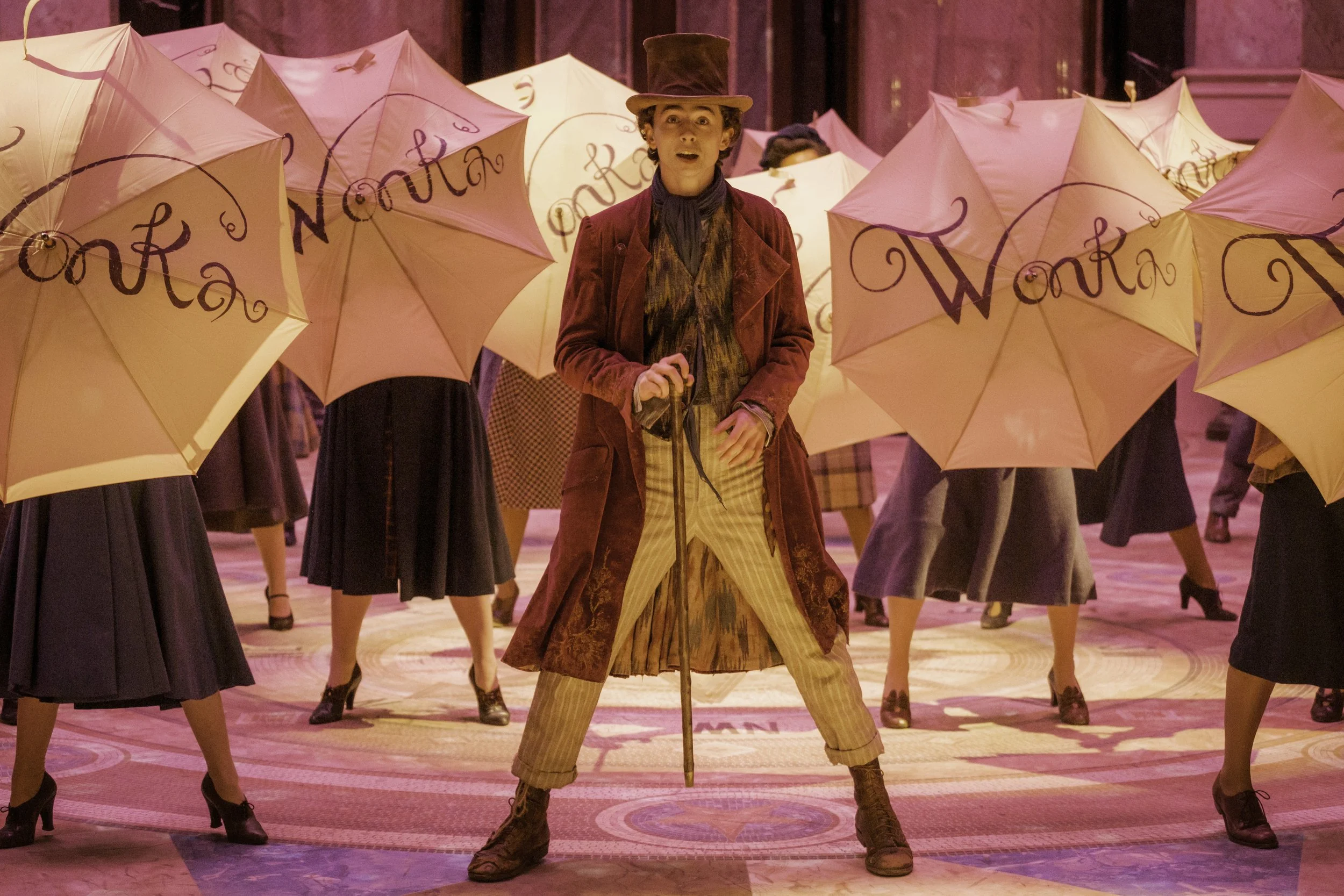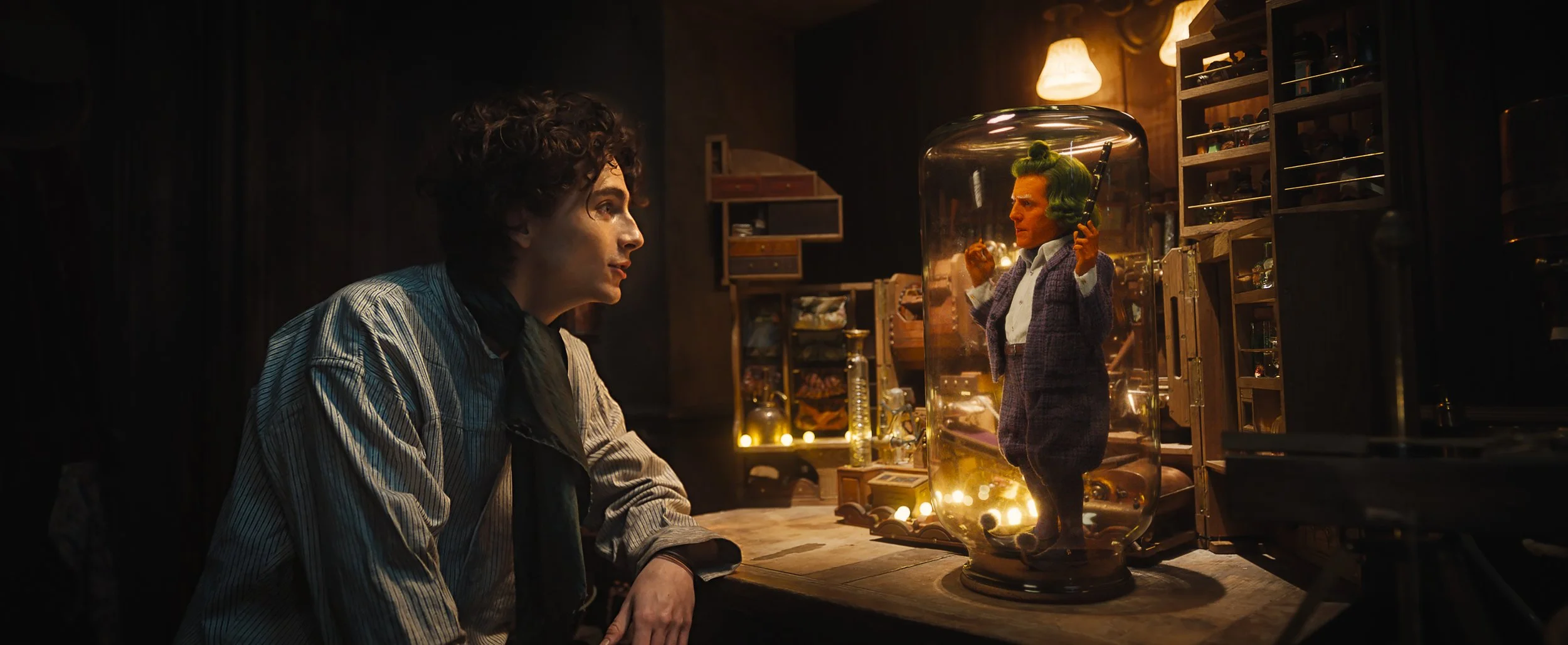MOVIE REVIEW: Wonka
WONKA– 4 STARS
Johnny Depp be damned, the most prominent Willy Wonka film faithful have met has been Gene Wilder’s incarnation from 1971’s Willy Wonka & the Chocolate Factory. Born from Roald Dahl’s 1964 novel Charlie and the Chocolate Factory and introduced in that classic walking cane gag of an entrance, the character was a mogul resurfacing after several years of seclusion out of the public eye to conduct a special international factory tour contest which became a recruitment exercise to find an heir to his mighty confection empire. Wilder portrays the deceptive, late-middle-aged man at the end of what was clearly a lifelong labor of love to create the best candies the world had ever seen.
LESSON #1: WAS HE ALWAYS THIS WAY?-- Likely a common question watching and hearing Gene Wilder’s antics is whether the candyman character was always that dubious and capricious. Treading on new territory not addressed by any Dahl book, the new film Wonka turns back the clock to answer that origin story. Genuflecting in Wilder’s direction while shedding his take’s sardonic shell for a dauntless consummate dreamer underneath, talented Oscar nominee Timothée Chalamet arrives to lay a new claim to this iconic part.
Wonka shows a Willy in his twenties arriving by boat to a coastal European town in the early 20th century with a few sovereigns in his pocket and a dream honoring his late mother (two-time Oscar nominee and director Paul King’s Paddington good luck charm Sally Hawkins) to open his own chocolate shop on the Galleries Gourmet, alongside the miserly mainstays of Slugworth (award-winning stage actor Paterson Joseph), Prodnose (TV presenter and comedian Matt Lucas), and Fickelgruber (musician/actor Mathew Baynton). The setting-establishing song “A Hatful of Dreams” adds up his youthful kindness and subtracts his coins, leading a now-broke Wonka to become hoodwinked in a crooked room rental contact at a laundromat overseen by Mrs. Scrubbit (The Favourite Oscar winner Olivia Colman) and her baritone main muscle Bleacher (Free Fire’s Tom Davis).
Locked in a dwelling of servitude, Willy befriends his fellow captives, including the senior leader Abacus Crunch (Dowtown Abbey mainstay Jim Carter) and the plucky youngster Noodle (newcomer Calah Lane), who are all indebted for different amounts of money and time with Mrs. Scrubbit. Spreading his positivity, Wonka inspires Noodle to become his assistant. She sneaks him out to gather exotic ingredients, reach the city streets, and dazzle the public with his pop-up appearances that show off his wondrous chocolate creations. Once his rivals– chiefly Slugworth– catch a whiff of his brilliance, they bribe the Chief-of-Police (Keegan Michael-Key) to shut down Wonka’s operations and apprehend him by any means necessary.
LESSON #2: THE KEY IS FLAIR– The Willy Wonka of this film is an inventor, magician, and chocolate maker wrapped up in one purple topcoat, a shabby tall hat, and a winning smile. On paper, the exploits of Wonka is poppycock material if the lead actor dishing out all the amazement cannot muster it himself. That’s where an unbridled Timothée Chalamet, in his singing debut, blows every wrapper off every candy bar in sight. He displays chipper enthusiasm, deft comic timing, and a bottomless appetite to impress anyone watching. If the ultra-serious and heroic Dune series can’t make him a bankable star, this will.
LESSON #3: ONCE YOU HAVE IT ONCE, YOU’LL WANT ANOTHER– Once Chalamet starts singing the songs composed by The Divine Comedy chamber pop frontman Neil Hannon and scored by bandmate Joby Talbot like the Oscar submission “A World of Your Own,” you will not want him to stop. He showcases a sweet, easy voice not trying to rattle any balcony rafters and one that shares spaces in many songs with his costars creating an agreeable synergy in the overall ensemble. Veering not far from the top-billed male adonis introducing Calah Lane’s Noodle to her first-ever taste of chocolate with orchestrated experience reactions, the same “once you have one…” urge spreads to Wonka’s flashy and sumptuous production values.
Boasting, by today’s inflated standards, a modest budget of $125 million, Wonka spared no expense to put on a full musical with all the artistic trimmings. Digital effects enhance (and luckily do not often overpower) the sets created by regular Christopher Nolan production designer Nathan Crowley (Tenet, Interstellar) and the vibrant camera choreography of cinematographer Chung-hoon Chung (Last Night in Soho). The creative outfits conceived by costume designer Lindy Hemming (Wonder Woman) combine with stellar makeup and hairstyling work to make every character, main or bit in stature, pop off the screen.
LESSON #4: EXTENDING GENEROSITY, HELP, AND KINDNESS TO OTHERS– Directed at and appealing to a wide family audience, the teachable hallmarks of Wonka are squeaky clean and clear from the get-go. Nearly to a fault, Willy gives entirely of himself for others. Even while stuck with his own sizable debt, Wonka’s first sales goal is to make enough money to buy everyone’s freedom. His laundromat friends and soon an adoring public see that generosity and reciprocate with kindness and help, all while his new villains seek to stamp that spirit out of him for business advantages and a certain orange-colored little humanoid named Lofty (a riotous Hugh Grant) tries to get his indigenous nation’s precious cocoa beans back.
This lovely approachability in a fabulous package should come as no surprise for a film directed by Paul King of two cherished Paddington films and co-written by his series partner Simon Farnaby. With little motif tingles of the old signature “Pure Imagination” melody percolating in Talbot’s score before the Chalamet’s rendition of the full song closes the film, Wonka builds a respectful and winsome bridge from the future to the past. If only to hear the actor sing some more, maybe we can get a pinky promise of a sequel in a few years that moves Chalamet’s Wonka into his industrial peak and future partnership with the full cadre of Oompa Loompas before the hermetic decline that connects it all back to Gene Wilder. We’ve seen what King can do with sequels surpassing originals. Talk about a possible full circle sweet tooth reward there.
LOGO DESIGNED BY MEENTS ILLUSTRATED (#1161)




